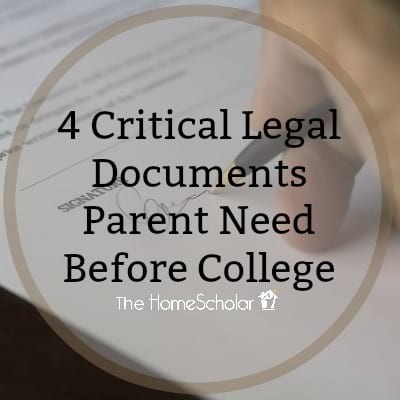4 Critical Legal Documents Parent Need Before College
After all there years of parenting, it's a shock to the system to realize
you need to get your child's permission in writing to discuss their health,
finances, and academics after they turn 18.
Crazy, right? Here's why.
Once your child turns 18, they are legally an adult and you are nothing but
chopped liver. Ok, that's not exactly true, you are still their parent, but
that's where it all ends. You aren't responsible for them anymore.
Knife to the heart, I know.
At the same time, 18 year old adults are notorious risk-takers. They feel
immortal. Bad things only happen to other people. Consequences won't happen
to them personally. That's why they are more prone to accidents.
Yikes! You need to be prepared.
At age 18 you are no longer allowed to receive information about your child's'
health, finances, or academics. But, what happens when a child becomes injured,
ill, incapacitated, or goes overseas? Without certain documentation, there
is nobody who can legally take care of things until they recover or return.
Until they have a spouse, they need someone legally designated to give and
get critical information.
And that's why you need to know about these four critical legal documents.
1. Health Care Power of Attorney
This will allow you to make decisions about health care when your child is
unable to speak for him or herself. Also called a health care proxy,
parents should get this in the state your child is living in, as well as
the state you are living in. You can get this through a lawyer or Legalzoom
fairly easily.
2. HIPAA Authorization
This will allow your child's health care providers to speak to you about
their medical condition and treatment. The "Health Insurance Portability
and Accountability Act" requires "Health Information Privacy Authorization"
before anyone can receive medical information about a patient. These forms
may be made available by the college your child attends during orientation.
3. Financial Power of Attorney
This will allow you to manage your child's finances, if they are injured,
ill, or overseas, and can't make their own financial decisions. If they
can't pay rent, car insurance, or cash their financial aid checks, then you
will be able to do those things. You can get this through a lawyer or
Legalzoom fairly easily.
4. FERPA Education Record Release
This will allow you to see your child's college grades, transcripts, and
any disciplinary action, and you'll know if they haven't submitted
financial aid forms. FERPA is the "Family Educational Rights and Privacy
Act" and it gives right to student. Without a student's permission, you
aren't allowed to know their academic progress, even if you are paying the
bill. This is important if you are paying for college, so you aren't
shocked if there is a huge increase in tuition due to failed/incomplete
classes, or failure to complete their financial aid forms. This form is
often available at the college during orientation.
Read these articles to learn more:
This whole "growing up and leaving home" thing is a tough season of life. If you
are in the midst of letting go, I think this article will help you make
sense of it all.
Letting Go When Homeschooling Ends: When Did My Baby Grow Up?

 Login
Login







.jpg)

Comments 2
You're welcome, Chris! Glad you found it helpful.
~Anita, Assistant to The HomeScholar
really practical and useful info that all parents of teens need. Thanks for posting this.